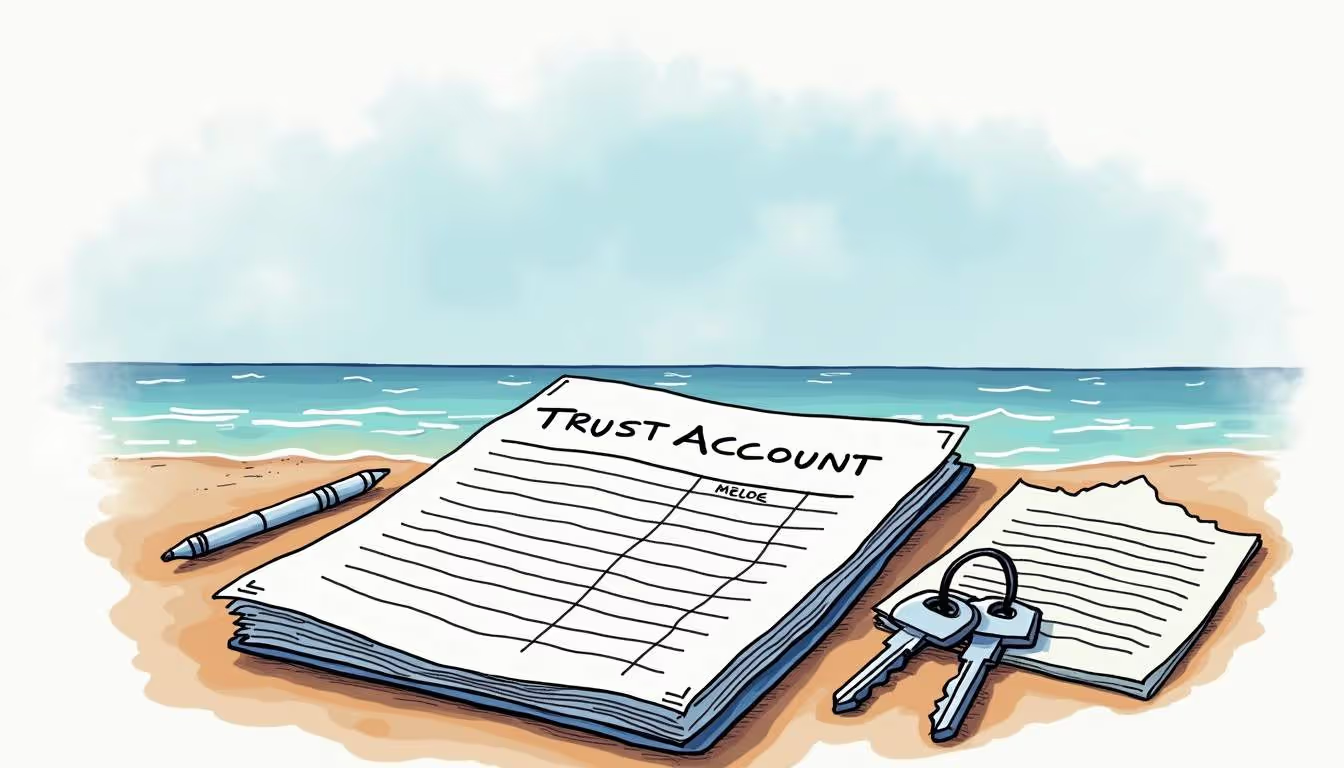The Basics of Trust Accounting for Vacation Rental Managers
Managing a vacation rental involves numerous responsibilities, from maintaining the property to ensuring guest satisfaction. One critical area that requires meticulous attention is trust accounting. Proper trust accounting safeguards both the property manager's and the guests' funds, ensuring compliance with legal regulations while promoting healthy financial practices.
Understanding the Basics of Trust Accounting
Trust accounting is a specialized accounting process that involves managing the finances related to clients, tenants, or guests. For vacation rental managers, this process means holding and tracking funds received from guests for stays, including deposits and prepayments, in a trust account. These accounts are designed to keep client funds separate from the manager's operational funds.
This separation is crucial because it reduces the risk of mismanagement and reinforces trust between the guests and the property manager. When funds are accurately recorded and accounted for, both parties can have peace of mind knowing that their financial interests are protected. Additionally, maintaining a clear distinction between trust and operational funds can prevent potential legal disputes, as it demonstrates a commitment to ethical financial practices and compliance with industry regulations.
Moreover, effective trust accounting practices can also enhance a property manager's reputation. By showcasing a transparent and organized approach to handling client funds, managers can attract more guests who value security and professionalism. This can lead to increased bookings and repeat customers, ultimately benefiting the overall business. Furthermore, regular audits and reconciliations of trust accounts can help identify discrepancies early, allowing for timely corrections and fostering a culture of accountability.
Key Terminology in Trust Accounting
Familiarizing yourself with specific terminology can help clarify the trust accounting process. Some essential terms include:
- Trust Account: A designated bank account meant exclusively for handling client funds.
- Trust Records: Detailed documentation of the financial transactions related to trust accounts.
- Client funds: Money received from guests for services such as rentals, deposits, and fees.
Understanding these terms will assist vacation rental managers in complying with relevant laws and managing their financial records effectively. Additionally, being well-versed in trust accounting terminology can facilitate better communication with financial advisors, accountants, and regulatory bodies. This knowledge can empower managers to ask informed questions and seek guidance when needed, ensuring that they remain compliant with state and federal regulations governing trust accounts.
Furthermore, it is essential to stay updated on any changes in laws or regulations that may impact trust accounting practices. Regularly attending industry seminars, workshops, or webinars can provide valuable insights and updates, allowing property managers to adapt their practices accordingly. By committing to ongoing education and professional development, managers can not only enhance their skills but also position themselves as knowledgeable leaders in the vacation rental industry.
The Importance of Trust Accounts in Vacation Rentals
Trust accounts hold significant importance for vacation rental managers. They serve multiple purposes that are not just beneficial but necessary for business integrity and legal compliance.

Firstly, a trust account maintains clear boundaries between personal and client funds. By keeping these finances separate, managers can avoid potential legal issues that may arise from co-mingling funds. Additionally, it facilitates smoother financial operations, ensuring that collected funds can be easily tracked and audited if necessary.
Strengthening Guest Trust and Satisfaction
Moreover, utilizing a trust account fosters transparency, which is vital in the hospitality industry. Guests are more inclined to trust property managers who demonstrate accountability through organized financial practices. The presence of a trust account assures guests that their money will be safeguarded until it is due to be disbursed for services rendered.
In essence, well-managed trust accounts can lead to heightened guest satisfaction, repeat bookings, and positive reviews, all vital components in the competitive vacation rental market. This level of financial diligence not only protects guests but also enhances the reputation of the property management company. When guests feel secure about their financial transactions, they are more likely to share their positive experiences with friends and family, effectively becoming brand ambassadors for the property. Furthermore, in an age where online reviews can make or break a business, having a solid financial foundation can be a key differentiator that attracts discerning travelers who prioritize safety and reliability.
Additionally, trust accounts can also streamline the process of handling security deposits and other fees. By having a dedicated account for these funds, property managers can ensure that deposits are returned promptly and fairly, which can significantly reduce disputes and enhance the overall guest experience. This proactive approach not only minimizes potential conflicts but also showcases a commitment to ethical business practices, further solidifying the trust between guests and property managers. In a landscape where customer loyalty is paramount, the effective use of trust accounts can serve as a cornerstone for building long-lasting relationships with clients.
Key Regulations and Compliance for Managers
Adherence to regulations is paramount in trust accounting, as failure to comply can result in penalties, revoked licenses, or even legal action. Different states and countries have varying rules governing trust accounts, and understanding these regulations is crucial. The landscape of trust accounting is not only complex but also constantly evolving, necessitating that managers stay informed about any changes or updates in the law. Regular training sessions and workshops can be beneficial for managers to keep abreast of these developments and ensure their practices align with current regulations.

For example, certain jurisdictions require property managers to maintain trust accounts with specific banks, ensure that funds are held in trust for a designated timeframe, and provide detailed record-keeping practices. Regulations may also dictate how and when funds can be disbursed. Additionally, some regions may impose restrictions on the types of accounts that can be used for trust funds, such as requiring interest-bearing accounts to benefit clients. Understanding these nuances is essential for effective management and can help in building trust with clients and stakeholders.
Record-Keeping Guidelines
Proper record-keeping is another critical aspect of compliance. Vacation rental managers should maintain accurate and up-to-date records that detail the following:
- All funds received from guests, including deposits and rent.
- Dates of transactions and variations in amounts.
- Disbursements made to property owners or service providers.
Following these guidelines helps ensure compliance with trust accounting regulations and provides clarity in financial dealings. Moreover, the implementation of digital record-keeping systems can streamline this process, allowing for easier access to records and reducing the likelihood of human error. Utilizing software designed for property management can also facilitate automated tracking of transactions, making it simpler to generate reports and audits when required. This not only enhances efficiency but also bolsters transparency, which is increasingly important in today's regulatory environment.
Furthermore, managers should be aware of the importance of retaining records for a specified period, as mandated by local laws. This retention period can vary significantly, and failing to keep records for the required duration can lead to compliance issues. Regular audits of record-keeping practices can help identify any gaps or inconsistencies, ensuring that managers are always prepared for potential inspections or inquiries from regulatory bodies. By prioritizing meticulous record-keeping and staying informed about compliance requirements, managers can safeguard their operations against legal repercussions and foster a reputation of reliability and integrity in the industry.
Common Mistakes to Avoid in Trust Accounting
Even seasoned property managers can fall prey to mistakes when it comes to trust accounting. Recognizing these common trust accounting challenges can enhance accuracy and efficiency in financial management.
- Co-mingling Funds: Mixing personal and client funds is one of the biggest red flags in trust accounting.
- Poor Record-Keeping: Failing to document transactions can lead to discrepancies and compliance issues.
- Delayed Disbursements: Not promptly refunding guest deposits can damage trust and reputation.
Being mindful of these errors aids in developing a robust trust accounting system that fosters transparency and accountability.
Best Practices for Avoiding Mistakes
Implementing best practices can prevent common trust accounting mistakes. Regularly reviewing financial records, using specialized accounting software, and conducting routine audits can enhance accuracy. Establishing a detailed workflow for financial transactions also helps in keeping everything organized.
How to Set Up a Trust Account for Your Vacation Rental
Setting up a trust account may seem daunting, but following a structured process can simplify the task significantly. Here are the essential steps:

- Choose the Right Bank: Select a bank that offers trust accounts with favorable terms and credibility.
- Complete Documentation: Ensure all paperwork, including your business licenses and identification, is complete.
- Understand Fund Handling: Familiarize yourself with how the bank processes transactions and manages account balances.
- Establish Accounting Procedures: Develop clear procedures for managing funds and maintaining records.
Following these steps will help create a solid foundation for trust accounting, ensuring both compliance and peace of mind.
Trust Accounting Made Simple
In conclusion, trust accounting is not just a necessary compliance measure but also a strategic approach that enhances the professionalism of vacation rental management. By understanding its basics, acknowledging its importance, adhering to regulations, learning from common mistakes, and wisely establishing a trust account, managers can create a trustworthy and efficient financial system that benefits both their business and their clients.
Ready to elevate your vacation rental management with seamless trust accounting? Look no further than VRTrust, an accounting software built for the short-term rental industry that automates and integrates with your Property Management Systems and payment gateways. Say goodbye to manual calculations and hello to automated owner and management company statements, trust reconciliation, and a comprehensive general ledger. With VRTrust, you can ensure compliance, enhance transparency, and foster stronger relationships with owners. Whether you're a property manager, an accounting partner, or a property owner, VRTrust turns financial chaos into clarity and puts you in financial control.
Sign up for a free trial today and experience the difference that automation and accuracy can make.



